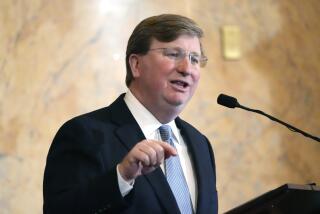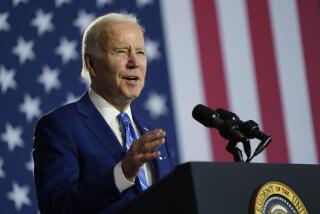Medicaid Expanded for Women
WASHINGTON — President Clinton called on the states Thursday to make rapid use of a major expansion of Medicaid to pay full treatment costs for thousands of uninsured women with breast or cervical cancer, the first time such coverage has been offered.
The new program, created by Congress in October, covers the expenses of patients with these diseases whose incomes are too high to meet the traditional guidelines of Medicaid, the federal-state health coverage program for the poor.
Uninsured patients with incomes up to 250% of the federal poverty line--about $35,000 a year for a family of three--would be eligible to have the government pay for all medical expenses in connection with the cancers. Such costs as surgery, radiation, chemotherapy and any follow-up care and medications would be covered.
In addition, the cancer must have been detected through the free screening programs operated by the federal Centers for Disease Control and Prevention through health centers, clinics and hospitals.
More than 1.5 million women have had the screenings since the program began in 1990, receiving free mammograms to check for breast cancer and free Pap smears to detect cervical cancer.
Because the program offered detection without treatment, experts believe that many women skipped the chance to get the test because they feared that they would be unable to pay for treatment if they learned they had cancer.
“It was a flawed policy,” said Fran Visco, president of the National Breast Cancer Coalition, who helped lead a successful lobbying effort on the issue. Visco received a standing ovation Thursday at a White House ceremony announcing efforts to speed up implementation of the policy.
Payments of bills will be financed through the Breast and Cervical Cancer Act, which won bipartisan approval in Congress.
Clinton thanked the audience of about 200 for their work on the issue and said that the states should begin work immediately to provide the coverage. Usually, the process of writing regulations by the federal government and the states is a lengthy and detailed procedure.
The federal government issued special guidelines to the states Thursday, asking them to prepare their plans “as quickly as possible.”
“We need to move on this in a hurry,” Clinton told the enthusiastic audience, which gave him and his wife, Sen. Hillary Rodham Clinton, a standing ovation. “Doctors and hospitals can start treatment immediately” for cancer patients if the states act quickly.
The president thanked the audience and his wife, who worked throughout the eight years of his administration to get more help for cancer treatment and research.
“I’d also like to thank Sen. Clinton,” the president said, laughing. “God, what a kick. . . . This is the first time I’ve gotten to say this,” he said of his wife, who was sworn in Wednesday as a Democratic senator from New York.
The president was introduced by Tonia Conine, an Oklahoma resident who had breast cancer detected through a CDC screening in March. She said that the new law means “no woman will ever have to suffer through my experience.”
She has no health insurance and was fortunate to have a doctor who performed her surgery free. “I am so thankful that my doctor made sure I got the care that I needed. There is no question that he did save my life.”
But she still has follow-up bills for chemotherapy and medication, expenses that have reached $9,000, she said in an interview after the ceremony. Other women in Conine’s situation--whose incomes are too high to qualify for the regular Medicaid program but too low to allow them to afford conventional health insurance--will be fully protected against the financial devastation that can be wrought by breast or cervical cancer.
The president also announced that the federal government will give its 1.8 million workers four hours of paid leave each year to go for health screening tests.
“This is an important step for everyone, and particularly for women,” Clinton said. “To take just one example, for women ages 50 to 69, regular mammograms reduce the risk of death by breast cancer by 30%. . . . I hope this will spur other employers to take similar actions.”
In California, the treatment financing program will be handled by the Department of Health Services, which operates Medi-Cal, the state’s version of the national Medicaid program.
Information about the CDC’s free medical screening program is available at https://www.cdc.gov./cancer or, in California, by calling (800) 511-2300.
More to Read
Inside the business of entertainment
The Wide Shot brings you news, analysis and insights on everything from streaming wars to production — and what it all means for the future.
You may occasionally receive promotional content from the Los Angeles Times.










